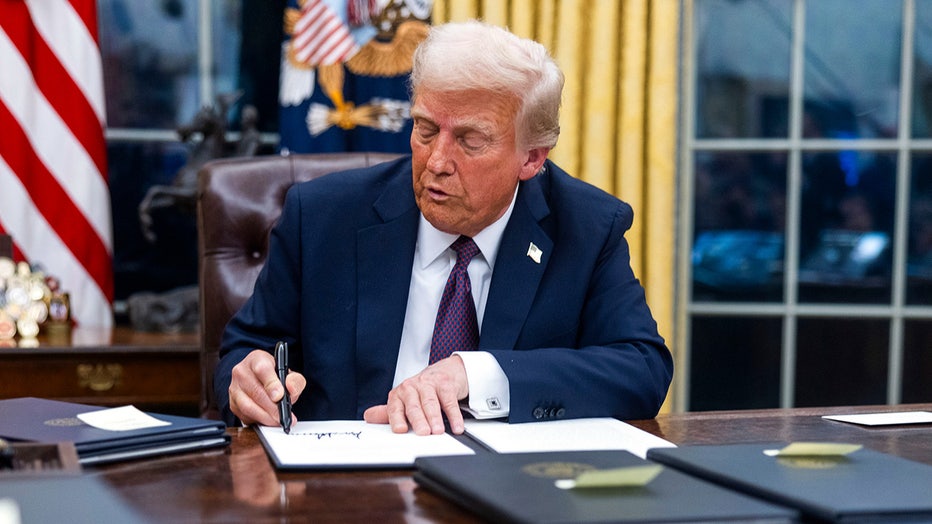Judge temporarily blocks Trump's order on birthright citizenship
Judge blocks Trump's birthright citizenship order
President Donald Trump’s executive order redefining birthright citizenship has been temporarily blocked by a federal judge in Seattle, Washington on Thursday. Washington Attorney General Nick Brown (D) spoke to reporters following the judge's decision.
SEATTLE - Less than three days after it was signed, President Donald Trump’s executive order to end birthright citizenship has run into its first legal roadblock.
A federal judge in Washington state has issued a restraining order, temporarily blocking enforcement of Trump’s order.
First legal ruling
U.S. District Judge John C. Coughenour ruled Thursday in the case brought by the states of Washington, Arizona, Illinois and Oregon, which argue the 14th Amendment and Supreme Court case law have cemented birthright citizenship.
The case is one of five lawsuits being brought by 22 states and a number of immigrants rights groups across the country. The suits include personal testimonies from attorneys general who are U.S. citizens by birthright, and names pregnant women who are afraid their children won’t become U.S. citizens.
The case was the first to get a hearing before a judge and the 14-day restraining order applies nationally.
What they're saying:
Judge Coughenour, a Ronald Reagan appointee, began Thursday's hearing by grilling the administration’s attorneys, saying Trump's executive order "boggles the mind."
"This is a blatantly unconstitutional order," Coughenour said, adding that he’s been on the bench for more than four decades and couldn’t remember seeing another case where the action challenged was so clearly unconstitutional.
PDF: Read the judge's full order
Trump for his part, vowed to appeal and said he was not surprised by the ruling given the Coughenour's location in Seattle.
"There's no surprises with that judge," Trump said at an afternoon event to sign executive orders.
What is birthright citizenship?
The backstory:
Birthright citizenship means anyone born in the United States automatically becomes an American citizen.
In the aftermath of the Civil War, Congress ratified the 14th Amendment in July 1868. That amendment assured citizenship for all, including Black people.
"All persons born or naturalized in the United States and subject to the jurisdiction thereof, are citizens of the United States and of the State wherein they reside," the 14th Amendment says. "No State shall make or enforce any law which shall abridge the privileges or immunities of citizens of the United States."
But the 14th Amendment didn’t always translate to everyone being afforded birthright citizenship. For example, it wasn’t until 1924 that Congress finally granted citizenship to all Native Americans born in the U.S.
Trump birthright citizenship order faces legal fight
Immigration attorney Jack Sung joins LiveNOW's Christina Evans to discuss the legal pushback against President Trump's executive order on birthright citizenship.
The other side:
Granting birthright citizenship is not the practice of every country, and Trump and his supporters have argued that the system is being abused and that there should be tougher standards for becoming an American citizen.
Some proponents of immigration restrictions have argued the words "subject to the jurisdiction thereof" in the 14th Amendment allows the U.S. to deny citizenship to babies born to those in the country illegally. Trump himself used that language in his 2023 announcement that he would aim to end birthright citizenship if reelected.
By the numbers:
Trump's order could impact hundreds of thousands of people born in the country, according to one of the lawsuits. In 2022, there were about 255,000 births of citizen children to mothers living in the country illegally and about 153,000 births to two such parents, according to the four-state suit filed in Seattle.
Trump executive order to end birthright citizenship

President Donald Trump signs executive orders in the Oval Office of the White House in Washington, DC, US, on Monday, Jan. 20, 2025 (Jim Lo Scalzo/EPA/Bloomberg via Getty Images)
What we know:
Trump signed the executive order to end birthright citizenship Monday evening. It's slated to take effect on Feb. 19.
The order is part of his larger strategy, he has stated, to "fully secure the borders" starting on his first day in office.
"The Secretary of State, the Attorney General, the Secretary of Homeland Security, and the Commissioner of Social Security shall take all appropriate measures to ensure that the regulations and policies of their respective departments and agencies are consistent with this order, and that no officers, employees, or agents of their respective departments and agencies act, or forbear from acting, in any manner inconsistent with this order," the order read.
Tuesday, several states and two cities sued to block Trump’s executive order.
What we don't know:
Since birthright citizenship is enshrined in the Constitution, it’s not clear how the order will play out.
The next steps of implementing the order are also unclear, as Trump has spoken before about taking executive action to end birthright citizenship, steering Congress to pass a law to end it, or taking the issue "back to the people."
What they're saying:
Trump said Monday he expected the legal challenge. He said automatic citizenship was "just ridiculous" and that he believes he was on "good (legal) ground" to change it.
"That’s a big one," he bantered with reporters while signing an order declaring the border emergency.
The Source: Information on the judge's ruling was taken from the court order and Associated Press reporting by Eugene Johnson and Mike Catalini. Background information came from previous FOX Television Stations reporting by Megan Ziegler and Catherine Stoddard, along with FOX News.

